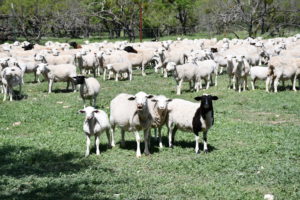Grants awarded to AgriLife Extension for sheep, goat genetic advancements

SAN ANGELO — The Texas A&M AgriLife Extension Service in San Angelo has been awarded a trio of grants totaling over $136,000 to further develop research and educational outreach projects related to improving sheep and goat production in Texas.
Although it is the largest sheep and goat producing state in terms of numbers, Texas has not widely adopted the genetic technology proven to improve the health and productivity of small ruminants, according to AgriLife Extension specialists.
Dr. Reid Redden, AgriLife Extension sheep and goat specialist, and Jake Thorne, AgriLife Extension associate, will be leading the newly implemented grant-funded programs. All research testing will be conducted on privately owned sheep and goats, which will allow for real-time industry adoption of technology, said Redden.
Redden also said it’s reasonable to assume the state could improve its productivity by 30% to 50% through the implementation of key programs, which are much more accessible and affordable due to recent technological advancements.
AgriLife Extension has been awarded grants for the following projects:
- “Genetic Selection Tools and Techniques to Benefit Texas Range Sheep Producers” – This $50,000 grant has the goal of getting seedstock producers of range Rambouillet and Dorper sheep to utilize genomic technology and enroll in the National Sheep Improvement Program, or NSIP. DNA sequencing, using the genomic sequencing chip, Flock54, will be used to pedigree match 2,500 animals. These animals will come from eight to 10 seedstock producers who provide breeding stock to a large percentage of the commercial sheep industry in Texas.
- “Training Texas County Extension Agents and Mentor Ranchers to Improve Small Ruminant Health and Productivity Through Natural Genetic Selection Strategies” – This two-year project funded by a grant worth over $76,000 will educate ranchers and AgriLife Extension agents on how to use the NSIP to develop estimated breeding values, or EBVs, and how to then use those to market seedstock. After training, mentored ranchers and agents will host field days and workshops in their local communities to share their knowledge with other producers to help improve the health and productivity of area herds.
- “Implementation of Genetic Selection Technologies on Texas Sheep Ranches” – This grant for just under $10,000 allows for DNA sampling and testing of progeny studs using high-density genomics chips. Thorne said this will allow the investigation of these rams’ genomes in depth – providing 660 times more genetic data than what the Flock54 panel reveals. He said analysis of that data will also provide important research opportunities, since the validation of gene markers is still necessary for many important polygenic traits associated with sheep.


